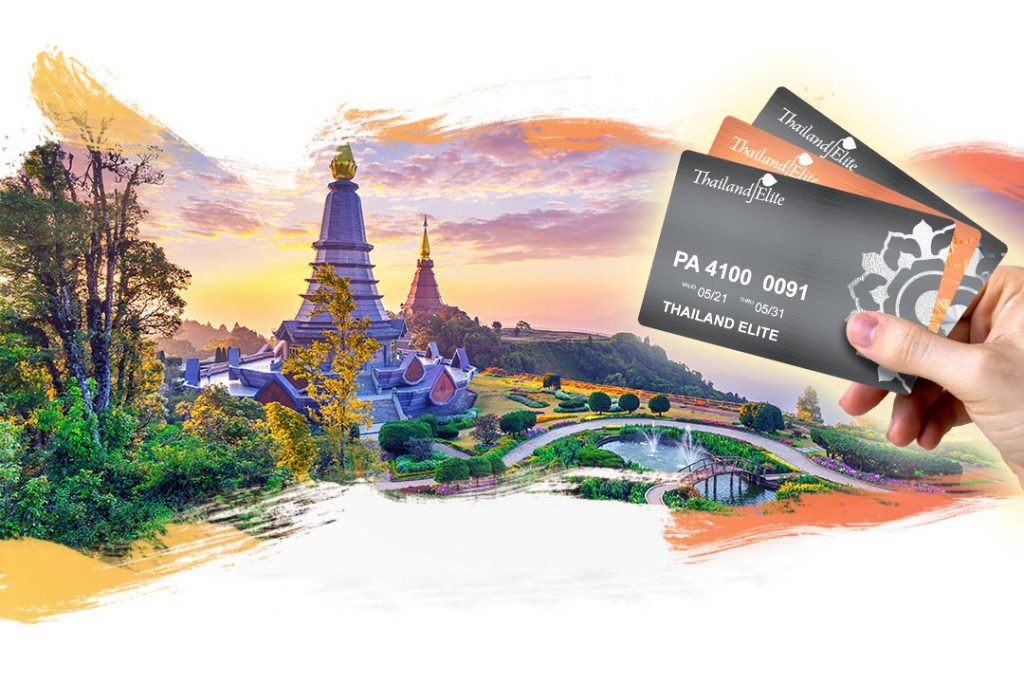Home

About Thai Visa News
Created in 2011, ThaiVisa News provides immigration information, immigration news, and travel guide and updates for people wishing to visit Thailand. The gateway to detailed information and requirements about Thai Visa application, whether researching travel opportunities, seeking information on travel restrictions, or looking for advice and assistance on how to move into Thailand. The comprehensive information of this website means that all answers to your immigration questions are at your fingertips.
Latest News


Traveling these days is not as easy as before, right? Travelers like you are subjected to more responsibilities, therefore, requiring you to exert more actions, and more effort to be able for you to have a successful trip to your destination.
It is highly suggested to please extend your patience with the travel procedures. And know that every country, including Thailand, is still in battle with the fight against COVID-19 and is doing its best to do so.
Please bear in mind that the additional requirements, responsibilities, procedures asked by the Thai authorities are implemented with the intention to keep the safety of the public health, both Thai nationals and foreign nationals entering the country.
It is understandable that the additional requirements, procedures, responsibilities to enter Thailand set by the Royal Thai Government may have caused some confusion to some travelers and this is the reason why we would like to do our best to guide you in how to have a successful trip to Thailand.
Before you Travel to Thailand
Before you travel to Thailand, there are some things that you will have to consider knowing and doing first.
Check your Country's Travel Restrictions
Aside from being updated with the travel advisory of your travel destination, Thailand. You should keep yourself updated with the travel restrictions of your respective country. Check your local travel information whether it is okay for you to travel to Thailand or not.
Check Thailand's Travel Advisory
Are you from a country that is allowed to travel to Thailand? Lucky for you, Thailand, as of the moment, is open for travelers from countries all over the world. Yes! any of you who are reading this are allowed to enter Thailand.
However, as mentioned earlier, patience is needed for it would not be that easy.
Check if you need a Valid Visa to Enter Thailand
If you are a non-Thai national but are a citizen from a Visa Exempted country then you are allowed to enter Thailand without a Thai tourist visa which will allow you to stay for a maximum of 45 days only.
If ever that you are not from a visa-exempt country and you plan to stay in Thailand for more than 45 days, you will have to apply for a Thai tourist visa or other visas for other purposes that will allow you to stay for more than 45 days from the Royal Thai Embassy or Consulates located in your country.
Thai Visa applications can be done online. Note that not every citizen from every country can apply online, some countries may require you to apply for a Thai visa physically. So, please check if you are a citizen eligible to apply online.
Once issued a tourist visa or special tourist visa, and want to extend their stay in Thailand, they can visit any Thai immigration office once the traveler has already arrived in Thailand.
Check Entry Options in Thailand
Know that upon entry to Thailand, you will be subjected to stay in a secured area to make sure that you have not contracted COVID-19 during your trip, depending on your vaccination status.
There are 2 options given by the Thai government:
Alternative Quarantine System/Hotel Quarantine
This option is available for both vaccinated and unvaccinated travelers.
This option will let travelers stay in a hotel room in a hotel establishment for 7 days (for vaccinated) or 10 days (for unvaccinated) or 14 days (for unvaccinated travelers traveling by land) for a mandatory quarantine.
Hotel Quarantine locations can be found at:
- Bangkok
- Buri Ram
- Chiang Mai
- Chiang Rai
- Chon Buri
- Krabi Mukdahan
- Nakhon Nayok
- Phang Nga
- Phuket
- Prachin Buri
- Surat Thani
- Tak
Travelers will have to book ASQ Hotels if they have chosen this option, the hotel will take care of providing you food and necessities which will be at your expense.
Sandbox Program
This option is only available for fully vaccinated travelers (except for children).
This option will let travelers stay, still, in a hotel room in a hotel establishment BUT, unlike the alternative quarantine, they will have the privilege to get out of the hotel premises and do any activity that they would like to do, as long as they are within the location of the Sandbox program.
Options of Locations of Sandbox program:
Travelers will have to book SHA+ Hotels if they have chosen this option.
For less hassle and the best-guaranteed price hotel booking, book at Agoda.
SHA+ Hotels in Phuket: https://www.agoda.com/?cid=1892424
Check, Obtain and Prepare the Entry Requirements to Enter Thailand
What are the requirements to enter Thailand? Well, to make it easy for you, here is the list of the requirements that are needed for you to be able to enter the Kingdom of Thailand. Please take note.
- Valid Thai Visa or Re-entry permit (except for Visa Exempted Countries)
- Passport (with at least 6 months validity)
- Confirmed Booked Flight to Thailand
International Flights to Thailand are available, for easy flight booking to Thailand, you can book at Qatar Airways. - Confirmed Booked ASQ/SHA+ hotel and Confirmed payment for COVID-19 test during the stay at the hotel.
- COVID-19 Insurance Certificate
In purchasing your travel health insurance for COVID-19 or the COVID-19 insurance, please make sure that the coverage is at least THB 1.75 million ($50,000) which will cover:- Medical treatment expenses
- Life insurance
- Unexpected expenses relating to COVID-19 incidents
- Thailand Pass
To obtain the Thailand Pass QR code, you will have to register and apply online. Choose among the 3 programs and fill out the form with the necessary details that were asked and upload the asked documents.
Note that the documents to upload are the requirements from numbers 2 to 5. So, please make sure that you have already obtained the requirements from 2 to 5 to obtain the Thailand Pass QR code via email.
To know more about the new system, visit the Thailand Pass page.
- Medical Certificate that shows a laboratory result indicating that you are negative from a COVID-19 RT-PCR test. The result shall not be issued more than 72 hours before departure.
- Certificate of Vaccination or Proof that you are vaccinated (especially if you are to choose the Sandbox Program)
- T8 Form
- Declaration Form
- Installed ThailandPlus Application
You can get your COVID-19 Insurance here: https://u.axa.co.th/Sawasdee_Siamlegal
During your Travel to Thailand
On the day of your travel, please make sure that you have all the requirements listed brought with you. For easy access to the required documents, it is suggested for you prepare and organize them.
Also, please follow COVID-19 safety measures. It is advised by the Tourism Authority of Thailand to travelers entering the country to practice:
- Distancing
- Mask Wearing
- Hand Washing
- Temperature Checking
- Testing for COVID-19
- Alert Application
Arrival in Thailand
Upon arrival in Thailand, the travelers are subjects for health screening, and the 1st nasal RT-PCR test will also be done upon arrival. Children will be tested through saliva RT-PCR testing.
After the 1st RT-PCR test, the travelers will be transferred directly to their booked ASQ/SHA+ hotel where they will stay until their required days of stay is complete.
During your Stay in Thailand
You may wonder what will happen during your 7-day or 10-day or 14-day stay in the hotel or in the Sandbox. Well, in general, during your 0-1st day of stay in the hotel, you will wait for the result of the 1st RT-PCR test.
For Travelers who are staying through ASQ hotel
- If Negative Result- you will stay in your room while waiting for your required days of stay to be ending. Only on the 6th-7th day (for vaccinated travelers) or 9th-10th day (for unvaccinated travelers) or 13th-14th day (for unvaccinated travelers traveling through the land) will they have their 2nd RT-PCR test.
- If Positive Result- you will be transferred to a health care facility for COVID-19 medical treatment which will be covered by the purchased COVID-19 insurance.
For Travelers who are staying through the Sandbox program
- If Negative Result- you will be able to roam around outside the hotel premises or any locations inside the Sandbox location and do any activity you can do. Only on the 6th-7th day will they have their 2nd RT-PCR test.
- If Positive Result- you will be transferred to a health care facility for COVID-19 medical treatment which will be covered by the purchased COVID-19 insurance.
Note: Travelers are not allowed to transfer to a different hotel.
Completion of Required Days of Stay
After completing the required days of stay and receiving a negative result from their 2nd RT-PCR test, that will be the only time they are allowed to travel to different Thailand destinations.
If the traveler decided that they will proceed to travel to different Thailand destinations, they will be given a "Release Form" which will serve as proof that they have completed their 7-day or 10-day, or 14-day stay.
If the traveler decided that they will proceed to go home to their country of origin or they will proceed to travel to other countries, they are still given a "Release Form". And is suggested to follow travel guidelines and advisory of the country that they will go home or the next country that they will travel to.

If you want to travel to Thailand, you’ll be glad to hear that after months of travel restrictions, Thailand is open for tourists and Thai nationals once again. From November 1, 2021, as long as you are fully vaccinated against COVID-19, you can now apply for the new Thailand Pass system. This new system will give Thailand’s tourism industry a significant boost from its ongoing economic difficulties. The Thailand Pass has been designed by The Ministry of Foreign Affairs and the Digital Government Development Agency to replace the Certificate of Entry or COE.
Thailand Is Open For Tourists
There’s no doubt that Thailand took travel restrictions seriously in order to combat the spread of COVID-19, and rightly so! Thanks to the strict Thailand travel restrictions that have been in place for over 18 months, Thailand is open for all tourists from November 1, 2021.
If you are hoping to travel to Thailand in the next couple of months, or perhaps visit your loved ones over the holiday season, here’s how to easily apply for the new Thailand Pass.

Who can Apply
Thailand Pass for Fully Vaxxed Travelers
By being fully vaccinated against COVID-19, you’ll be able to apply for the new travel pass and avoid the frustration of extended quarantine when visiting from overseas. This applies to both fully vaccinated tourists and Thai nationals who came from the 63 low-risk countries on the list. Take note that you must have stayed in these countries for at least 21 days. You will be under the Test-and-Go program that only needs 1 night of stay in an ASQ or SHA+ hotel while waiting for your PCR test result which was taken upon arrival.
Thailand Pass for Fully Vaxxed Travelers under the Sandbox Program
Fully vaccinated travelers who came from outside the "low-risk" nations are still allowed to enter Thailand. They will be under the Sandbox Programme when applying for the Thailand Pass online. Under the Sandbox Programs, travelers can enter Thailand and are required to spend a minimum of 7 nights in an accredited SHA+ Hotel in these Sandbox areas such as Bangkok, Pattaya, Hua Hin, Chiang Mai, Phuket, or Samui. After staying in a SHA+ hotel, they will be allowed to travel to any place in Thailand. Unvaccinated children who are 12 to 18 years old may travel with their parents without quarantine.
Thailand Pass for Unvaxxed Travelers Under the Quarantine Program
Unvaccinated travelers and those who only have their first dose of the vaccine are still allowed to enter Thailand, but they will have to do the 10 nights mandatory quarantine at any accredited ASQ or AQ quarantine hotel. They will be under the Alternative Quarantine when applying for the Thailand Pass online.
Thailand Travel Restrictions
Starting November 1, 2021, Thailand is opening its international borders to all travelers. Whether they will have to do the mandatory quarantine or not, it will be based on their vaccination status and their point of origin.
No quarantine is offered to those fully vaccinated travelers who came from the 63 listed low-risk countries. Whilst, the sandbox programs are offered to those fully vaccinated travelers who came from countries not listed in the low-risk category. A 7-day quarantine is required before they can freely travel to other places in Thailand.
Alternative Quarantine Program is offered to those unvaccinated and partially vaccinated travelers. They will have to go through the 10 days of mandatory quarantine in any accredited quarantine hotels in Bangkok, Pattaya, Chiang Mai, Phuket, or Samui. After that, they can freely travel to other places in Thailand.

Required Documents For The New Thailand Pass
If you are fully vaccinated and will travel to Thailand from one of the listed countries eligible to apply for the new travel pass, you’ll need to provide the following documents;
- Passport
- Vaccination Certificate
- COVID-19 Travel Insurance Certificate
- ASQ, SHA+ Hotel Booking (1 night)
- PCR Test Booking
- Flight Information
- Thai VISA (if applicable)
Here are the countries currently listed as safe and able to apply for the Thailand Travel Pass.
Thailand Pass Application Process
The Thailand Pass involves a QR code system. You’ll first need to register at the Thailand Pass web portal and provide relevant personal and travel information, as well as upload your key documents and evidence. You’ll then receive confirmation of your application. You must now wait for the Thailand Pass to be approved. When approved, you’ll receive the QR entry code via email.
Please note that the application process can take up to 5 to 7 working days, so it’s always best to apply in advance.
Thailand Pass Legal Support
While it is free to apply for the new Thailand Pass, travelers who require assistance and support can do so. At Siam Legal, we assist clients and foreign nationals by preparing the required documents and paperwork needed to start and complete the Thailand Pass application process.
Our legal experts can help you save precious time by working on your behalf and minimizing the risk of VISA-related issues or rejections. In some cases, if travelers upload documents that are in poor condition, or provide inaccurate or misleading information as part of a VISA application process, the embassy or consulate may reject your application, and therefore you won’t be able to travel to Thailand.
There is also a lot of confusion regarding the new travel pass and tourists who have recently received approval for or are in the process of applying for the Certificate Of Entry (COE). In this case, you may feel the need to speak with a legal expert regarding your VISA application. Pre-approval COE applicants must submit all required documentation by November 7, or your request will be automatically rejected. You must also apply for the Travel Pass to travel to Thailand. So, rather than run that risk of rejection, it may be wise to seek legal advice and support.

 As of October 1st, the Thai government has made travel and tourism a possibility for visitors from any country in the world. Using the innovative Sandbox program, you can see the beauty of Thailand without quarantine. This update will cover:
As of October 1st, the Thai government has made travel and tourism a possibility for visitors from any country in the world. Using the innovative Sandbox program, you can see the beauty of Thailand without quarantine. This update will cover:
- The latest news for Thailand travel restrictions
- An explanation of the Sandbox programs
- Eligibility requirements for travelers visiting Thailand.
News From the Tourism Authority of Thailand
 Cases of COVID-19 are on the decline as Thailand makes its way out of the pandemic. With vaccination numbers rising quickly, the Tourism Authority of Thailand is informing the world that Thailand is now welcoming travelers from any country in the world. Now, fully vaccinated visitors can enjoy the beauty of Thailand through the Sandbox program.
Cases of COVID-19 are on the decline as Thailand makes its way out of the pandemic. With vaccination numbers rising quickly, the Tourism Authority of Thailand is informing the world that Thailand is now welcoming travelers from any country in the world. Now, fully vaccinated visitors can enjoy the beauty of Thailand through the Sandbox program.
What is the Thailand Sandbox?
You can divide the program into the Phuket and Samui Sandbox: The Phuket Sandbox program allows fully vaccinated travelers to enter Thailand without needing to quarantine for 14 days. As of October 1st, tourists from any country in the world can take advantage of the Sandbox to see Thailand — to travel to other parts of the country, you must first stay seven nights. Similarly, the Samui Plus Sandbox Plan allows travelers to enter Thailand via Koh Samui, Koh Phangan, and Koh Tao. Tourists stay at an SHA Plus hotel upon arrival for seven days, during which time they can travel the islands as they wish. If by Day 8, their COVID-19 test is negative, they may travel anywhere in the country.Who Is Eligible?
Fully vaccinated travelers from any country (who have stayed in that country for at least 21 days before leaving) can visit Thailand through the Sandbox program. Unvaccinated children (under 18) are also welcome so long as they travel with vaccinated parents. Before traveling, visitors must ensure they have met all of the following requirements:- Proof of vaccination or a vaccine certificate from a WHO-approved vaccine 14 days before departure (at least).
- Travel Insurance that covers your COVID-19 treatment for up to $100,000 USD.
- Proof of negative PCR test results from within 72 hours of your departure.
- A certificate of entry (COE), which is needed by all travelers to Thailand.
- A 7-night stay booked at a SHA+ hotel.
- Payment for COVID-19 tests for use on Day of arrival and Day 6 or 7 of your stay.
- A booked return flight. All flights must either arrive through Phuket or Koh Samui.
- A Thai visa if needed for your nationality.
Visit Phuket and Koh Samui Today!
There has never been a better time for fully vaccinated foreign tourists visiting Thailand. With beautiful beaches and shortened stay-put orders, the Phuket Sandbox and Samui Plus Plan are the best way to stay in Thailand while protecting the nation’s plans to reopen. Interested in learning more? Subscribe to receive weekly updates on How to Travel to Thailand.Frequently Asked Questions
Who can travel to Phuket from abroad?
Travelers from any country in the world are now eligible to travel to Thailand under the Sandbox program. Tourists can enter through Phuket or Koh Samui.How does the Phuket Sandbox work?
Upon arrival in Phuket, travelers must stay put in a SHA+ hotel for seven days. After passing a COVID-19 test on their first and last day, they may travel to anywhere else in the country. Check out the current promotions for hotels in Phuket.What are SHA+ hotels?
Through the Sandbox program, travelers do not need to quarantine. However, they must stay at a SHA+ hotel for their first seven days. SHA+ certification means hotel staff must be vaccinated, the hotel must have appropriate travel guidelines and protocols, and overall cleanliness and ease.What are the COVID-19 insurance requirements?
Travelers to Thailand, both Thai and foreigners must obtain COVID-19 insurance prior to their trip to Thailand. The coverage must be a minimum of $100,000 USD.Is there help available to meet all the paperwork requirements?
Travelers can call their local Thai Embassy to ask for assistance with any questions. Also, professional service providers such as a law firm in Thailand can be hired to provide you assistance in preparing the documents.

Updated last March 11, 2022
Phuket is open, Koh Samui is open! Two of the most known paradise islands in Thailand had just opened. Travelers are lining up to book flights and cannot wait to have the time of their lives like before. If you are a traveler and eyeing the paradise islands in Thailand, one must know what the requirements are to enter such islands within the country, right? Especially now that the government of Thailand has implemented stricter safety measures due to COVID-19.
Entering the Paradise Islands in Thailand
What do you need to do before, and what do you need to have with you, to be able to enter the country? Here is the list that will answer that question:
- One must have a passport with at least 6 months validity
- One must be from an approved country by the Centre for COVID-19 Situation Administration
- One must have a Thailand Pass ID
- One must already be vaccinated with a vaccine approved by Thailand’s Ministry of Public Health (MOPH) or World Health Organization (WHO)
- One must have booked and purchased return air travel
- One must have booked and paid accommodation and required RT-PCR tests at SHA Plus (SHA+) hotels, and in the case of Samui+, Samui Extra Plus hotels
- One must have purchased travel insurance with COVID-19 treatment coverage of at least $20,000
- One must have been tested negative for COVID-19 not more than 72 hours before travel
Covid-19 Travel Insurance Required
All of you might not know that not all travel insurance covers the COVID-19 infection. With COVID-19 continuing to spread, not forgetting to mention the variants emerging around the world. Those travelers who are fully vaccinated, and unvaccinated travelers, will and still be needing this 100%.
What is COVID-19 Travel Insurance? Unlike the pre-COVID-19 insurances, it does not only cover injuries or accidents. It is insurance that covers your expenses in case an emergency happens to a traveler that involves a COVID-19 type of emergencies. It is one of the latest requirements that the government implemented for the inbound travelers to have and it supposedly covers $20,000 minimum.
There are several insurance providers that you can find now, you can purchase it easily online with the specific insurance company that is to your liking. To help you with that, you might want to visit AXA Insurance and consider it as your insurance company option.
Get Your COVID Insurance for Travel to Thailand. CLICK HERE
Coverage of COVID-19 Insurance
Before you purchase your insurance, you must check the coverage of the insurance that you are supposed to purchase. It is supposed to cover costs of isolation, quarantine, testing, treatments, and other worse possible cases that you might experience with COVID-19 during your stay in the country. It is also to cover any losses that hindered your travel during the COVID-19. One example of that would be travel cancellations and lost travel bookings.
Here are the three components that you must remember upon purchasing your insurance, your insurance must cover:
- Medical Coverage. A sensible approach to travelers must have a minimum of $20,000 that covers all treatment costs connected with COVID-19 infection.
- Life Insurance Coverage. In case of the worst possible cases, due to COVID-19 infection, the $20,000 will be paid to the named beneficiary.
- Unexpected Expenses. In case you have travel disruptions or lost trip arrangements, or any flights due to COVID-19 infection. The insurance shall cover it too.
If you have already decided where you should purchase your insurance, do not forget to read the coverages. Check if the insurance will cover the listed coverage above. Also, do not forget to check and read every detail, even the small prints of any policy to avoid the wrong or invalid type of insurance, which is the case of some, or even fraudulent scams.
COVID-19 Insurance: Worry-Free Travel
The Thai government is doing its best to give travelers a relaxing and safe trip during their stay in the country. The only obstacle a traveler will have before entering is the fact that they will have to fill up some applications, may it be an insurance application form, application for booking flights and hotels, and others. Other than that, is for travelers to follow the safety measures for the travelers’ own safety for only a limited number of days.
COVID-19 insurance is a need for travelers. This COVID-19 insurance will cover the expenses in case of COVID-19 related emergencies. This insurance will also keep you away from unwanted problems that you will have like unexpected payments or bills during your trip because of unexpected events. If one did not purchase the needed COVID-19 insurance or has mistakenly purchased the wrong insurance, someone else will pay the expenses. The Thai government will be the one to cover the expenses.
The Thai government is doing its responsibilities, and travelers are encouraged to do their part as visitors. The worry-free travel will only be effective if both sides are doing their part and doing their designated responsibilities.


With the advent of the COVID-19 pandemic, the worldwide travel industry has been decimated, with almost all countries bringing in additional travel restrictions in a desperate bid to halt the spread of infection. With different countries bringing in different measures and paperwork requirements for both people leaving and arriving in the country, the whole situation has been very confusing for people wanting to travel. Also, many countries have changed their travel restrictions several times so it has been difficult, if not impossible to keep up to date with the new measures. Thailand is no different and was effectively closed to tourism for many months, however, Thailand is now open for tourism so you could come right now, that is, if your country allows you to leave, and you can secure all the necessary documents. In this article we will cover information relating to Thailand travel restrictions that are currently in place.
There's no reason why you can't come now if you can secure a certificate of entry from your local Thai embassy, can obtain the required COVID travel insurance, are willing to have a COVID test, and most crucially, are willing to be quarantined in a hotel for 7, 10 or 15 nights on arrival, all at your own expense at an ASQ hotel in Thailand. For many travelers, it's the quarantine that is putting them off, most people don't want to spend up to two weeks of their precious holiday time confined to a hotel room with nothing to do, not to mention the $1000+ that it costs. Therefore the question that most people are asking is not "when can I travel to Thailand", but "when can I travel to Thailand without having to endure quarantine?".
And at the moment, not even the authorities in Thailand appear to know the answer to this question. However, the government has already approved reduced quarantine of 7-10 days for travelers who have been vaccinated, so it does appear that they are thinking about loosening the restrictions in a bid to try and get their tourism industry going again. There is a campaign called “Open Thailand Safely” which has been petitioning the government to relax the restrictions on the 1st of July to give the economy a boost, as many Thais are struggling without the huge amount of money that tourism used to bring to the country.
At the moment, however, the government seems to be taking a cautious approach to reopening the country with other online sources suggesting that the 1st of October would be a more likely date that travelers will be allowed in without quarantine. Realistically, however, nobody knows, as it only takes a small spike in cases and governments around the world panic and lockdown their countries again.
In short, if you have been vaccinated, a 7 day quarantine period is now possible, or even to participate in the new “area quarantine” scheme which has been mentioned several times, yet is not currently in operation. If, like most people, you don’t want to be quarantined at all, then unfortunately it’s looking like you will have a wait of many months yet, especially seeing as a new wave of infection is being seen in many countries.
When Thailand eventually does re-open fully to international tourism, it looks like the government will take a phased approach, and it seems that they are planning to open up Phuket first, initially with reduced quarantine and hopefully progressing towards no quarantine if everything goes well. The "Phuket Sandbox" idea is purported to start on 1st of July and should allow vaccinated travelers to visit the island without having to undergo any kind of quarantine at all, however they will not be allowed to leave Phuket for the first seven days. Also, it’s very likely that this date will be set back if any new waves of infection hit the country.
As a final note, you should plan ahead for your Thai Visa for your trip. Many foreigners are now opting for the hassle free Thailand Elite visa. While others apply for a retirement visa or business visa for Thailand. The most common Thailand visa application is the Tourist Visa. Please remember to plan in advance for your visa and travel documents that are necessary to enter Thailand during the COVID-19 pandemic.

Updated last November 4, 2021
If you are planning to travel to Thailand, you will be needing an insurance policy that meets the official requirements for the Thailand Pass. The Thai government made it compulsory for all foreign travelers who wish to enter the kingdom to have a travel insurance policy that covers the treatment of COVID-19.
The Office of Insurance Commission (OIC) published two Registrar Orders that insurance policies relating to health, travel, accident, and life should cover risks relating to COVID-19 unless the policyholder has become infected with the virus prior to purchasing the policy or during the waiting period.
COVID-19 Insurance for Foreigners
The Office of Insurance Commission in Thailand has endorsed a medical insurance policy for foreigners which has been approved by the Thai government. This policy contains two parts:
- If the traveler is tested positive for COVID-19, then all the medical expenses at the hospital will be paid by the insurance company. The cost of treatment to be covered by the insurance company is almost 50,000 USD or 1.75 million baht.
- If the traveler died due to COVID-19, the insurance company would bear all the expenses of burial and repatriation, with a maximum coverage of approximately 1.75 million baht or 50,000 USD.
The Insurance Policies with coverage of COVID-19
The following insurance policies should cover risks relating to COVID-19:
- health insurance;
- life insurance;
- accidental insurance; and
- travel insurance;
These insurance policies can be purchased online. You need to submit the requirements specified by the insurance company, including the date of coverage. Make sure to purchase your insurance policies from duly approved insurance companies by the Thai government.
The Cost of COVID-19 Insurance in Thailand
The cost of the insurance of COVID-19 will vary for the age difference and the period you remain in Thailand. The price of the COVID-19 insurance ranges from 2,600 baht to 100,000 baht.
The procedure for buying medical insurance for Thailand
For getting a visa and certificate of entry to Thailand, you need to find medical insurance policies that cover COVID-19. It makes it easy for you to get the most appropriate one. There are two ways to find the insurance policy of COVID-19 for Thailand.
- You can contact an insurance broker of the insurance company
- You can check online for instant purchase of insurance policy
A point to remember is that you should check all the coverage policies of the COVID-19 to take the least expensive policy that covers all the requirements. You can purchase this online through your credit cards. Several insurance providers offer COVID-19 insurance policies online. And you can check for a company that is on the top for acceptance of a visa. You can get the certificate instantly and then print it to apply for visa processing.
AXA Insurance offers a unique package of insurance named "Sawasdee Thailand." Thousands of foreigners use AXA for the certificate of COVID-19 insurance in order to successfully obtain a visa and Thailand Pass for Thailand. It includes the following features that cover all the prerequisites of the Thailand insurance commission:
- It includes the treatment of COVID-19 not more than 50,000 USD.
- You can choose the period that you require or for how long you will stay in Thailand. For example: it can be 30, 60, 90, or 1 year.
- It begins with the clearance at the immigration passport control at the airport in Thailand.
- A certificate is provided
Why require COVID-19 insurance?
The cost of treating coronavirus disease is very expensive due to the limited availability of the medicines used for the treatment. Having known that, the Thai government has made the extra step in ensuring their foreign guests' peace of mind during their stay in the Kingdom by requiring them to have the COVID19 insurance. In an unlikely event that the foreign guests get infected by the virus, they won't have to pay out of their pocket the medical expenses at the hospitals in Thailand.
Is the COVID-19 insurance policy Expensive?
The cost of getting COVID-19 insurance is just a pinch compared to the hospital bill of a non-insured COVID-19 patient. It is an additional expense to travelers, however, with the ongoing pandemic, it is too risky not to have one. You can obtain a 30-day policy that starts at about 4,000 THB. But the most significant reason that determines the price is the risk of the virus in the country from where you are applying for a visa. The costs differ from the government to private hospitals, so it can be expensive and it depends on your budget.
Get your COVID-19 travel insurance here:
Thai Elite Visa
Thailand Elite visa is a special visa aimed for high networth businessmen, digital nomads, retirees, investors, high income individuals, and families looking to move in to Thailand. The Elite member or card holder has special privileges such as VIP treatment at the airport, exclusive spa and golf courses, special discount at major department stores and shopping malls, elite personal assistance, and many more. To learn more if Thailand Elite Visa is the most suitable long term visa for you, just click the link below.





